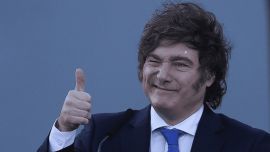US Secretary of State Antony Blinken began his tour of Latin American countries on Monday in Colombia, where combatting drug trafficking topped the agenda.
Blinken met with Gustavo Petro, Colombia's first ever leftist president, who has harshly criticized the war on drugs as a failure.
After Colombia, Blinken will travel to Chile and Peru, nations which have also recently elected leftist presidents.
But in Colombia, Petro's policy of offering an olive branch to leftist guerrillas and drug traffickers – as long as they lay down their weapons and cease illegal activities – is in stark contrast to his conservative predecessor Ivan Duque, who enjoyed good relations with the United States.
Blinken made clear Monday that "extensive common ground" remains even under the new president's position.
Colombia, which suffered decades of civil war fueled in part by drug trafficking, is the world's leading cocaine producer, with the United States as its principal market.
"We strongly support the holistic approach the Petro administration is taking," Blinken said during a joint press conference with the Colombian president after their meeting at the Casa Narino palace.
"On both the enforcement side, but also on the comprehensive approach to the problem which is so necessary, I think that we're largely in sync," he added.
As part of that "comprehensive" approach, Petro highlighted his goal of purchasing arable land to redistribute to small farmers, at a cost of "$7 to $14 billion," he said.
He also called on the United States to strengthen cooperation in the field of intelligence and in the protection of maritime areas around Colombia.
On immigration, a thorny issue for the administration of US President Joe Biden as his Democratic party heads into the upcoming midterm elections, Blinken praised Colombia for welcoming more than two million displaced Venezuelans.
He called a policy by Colombia, launched under the previous administration, to give temporary protected status for 10 years to Venezuelans "a model for the region – indeed, a model for the world."
ATTENTION TO THE REGION
The trip by the top US diplomat, whose country has been more focused in recent times on Asia and on the war in Ukraine, appears aimed partly at addressing any concerns of US neglect for its hemispheric allies.
His trip began a day after a hard-fought first-round election in Brazil, where voters faced a stark contrast between far-right President Jair Bolsonaro and leftist challenger and former president Luiz Inacio Lula da Silva.
After a tight first round, in which Bolsonaro did surprisingly well, there will be a run-off on October 30 with Brazil possibly also about to swing to the left.
Despite speculation that Bolsonaro might not accept electoral defeat, Blinken said Sunday that the US shares "Brazil's confidence that the second round will be conducted in the same spirit of peace and civic duty."
Blinken's tour comes on the heels of a prisoner exchange between the US and Venezuela, reflecting a cautious warming between the two despite the fact that Washington has never recognized the disputed 2018 re-election of Nicolas Maduro as president.
"We have never had stronger relations with this hemisphere," said Brian Nichols, US Assistant Secretary of State for Western Hemisphere Affairs, ahead of Blinken's trip.
"We are not judging countries based on where they fall on the political spectrum, but rather their commitment to democracy, the rule of law, and human rights," he said.
BUSY OAS AGENDA
Blinken travels to Chile Wednesday for talks with President Gabriel Boric, a 36-year-old former leader of student protests who came to power in March.
The US diplomat will end his trip in Peru on Thursday and Friday, where he will meet President Pedro Castillo, a former union leader who is the son of peasant farmers. Since coming to power last year, Castillo has faced multiple investigations for corruption and influence-peddling.
While in Lima, Blinken will take part in the yearly general assembly of the Organization of American States, which has a crowded agenda.
It will consider a resolution urging an end to "Russian aggression in Ukraine", though some Latin American capitals have expressed hesitance – as well as resolutions on rights abuses in Nicaragua and on the dire economic and political situation in Haiti.
Throughout his trip, Blinken will raise US concerns about democracy, immigration, human rights and climate change, the State Department said.
– TIMES/AFP



















Comments